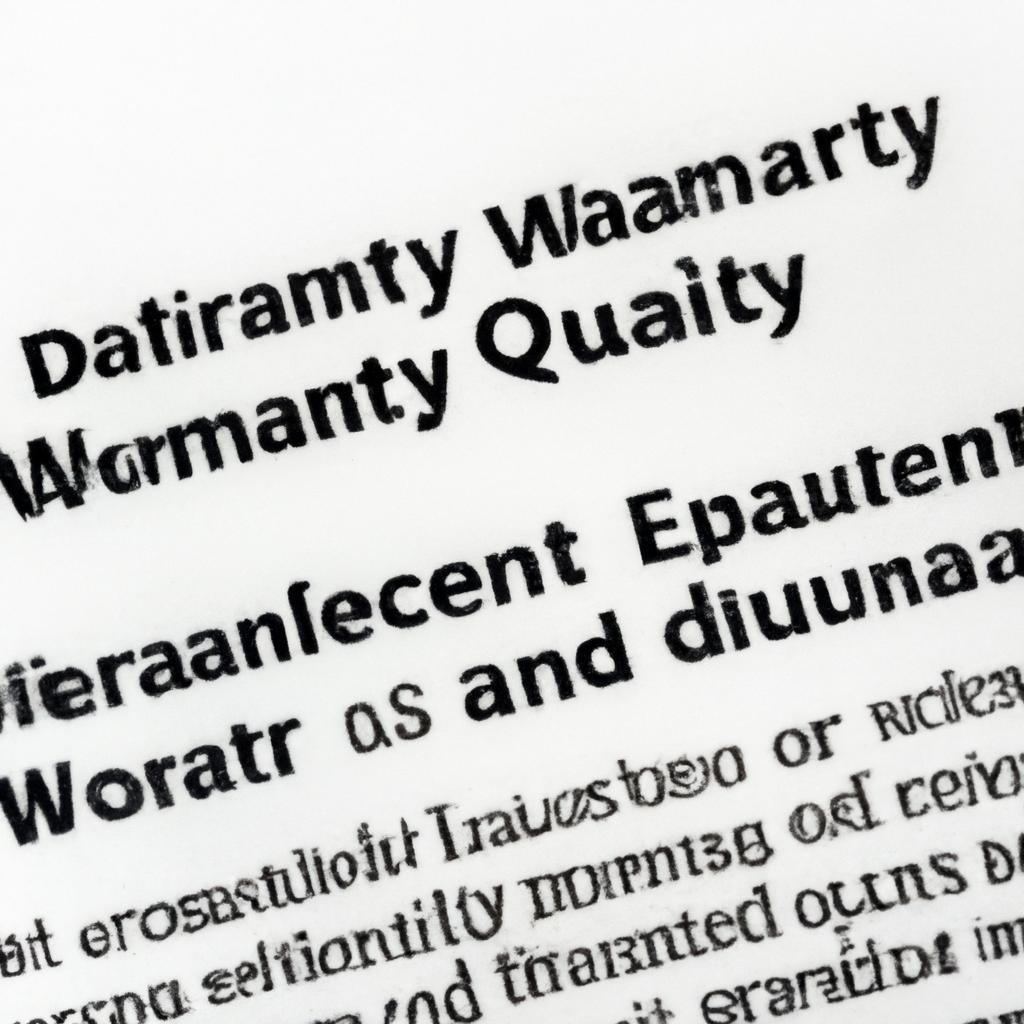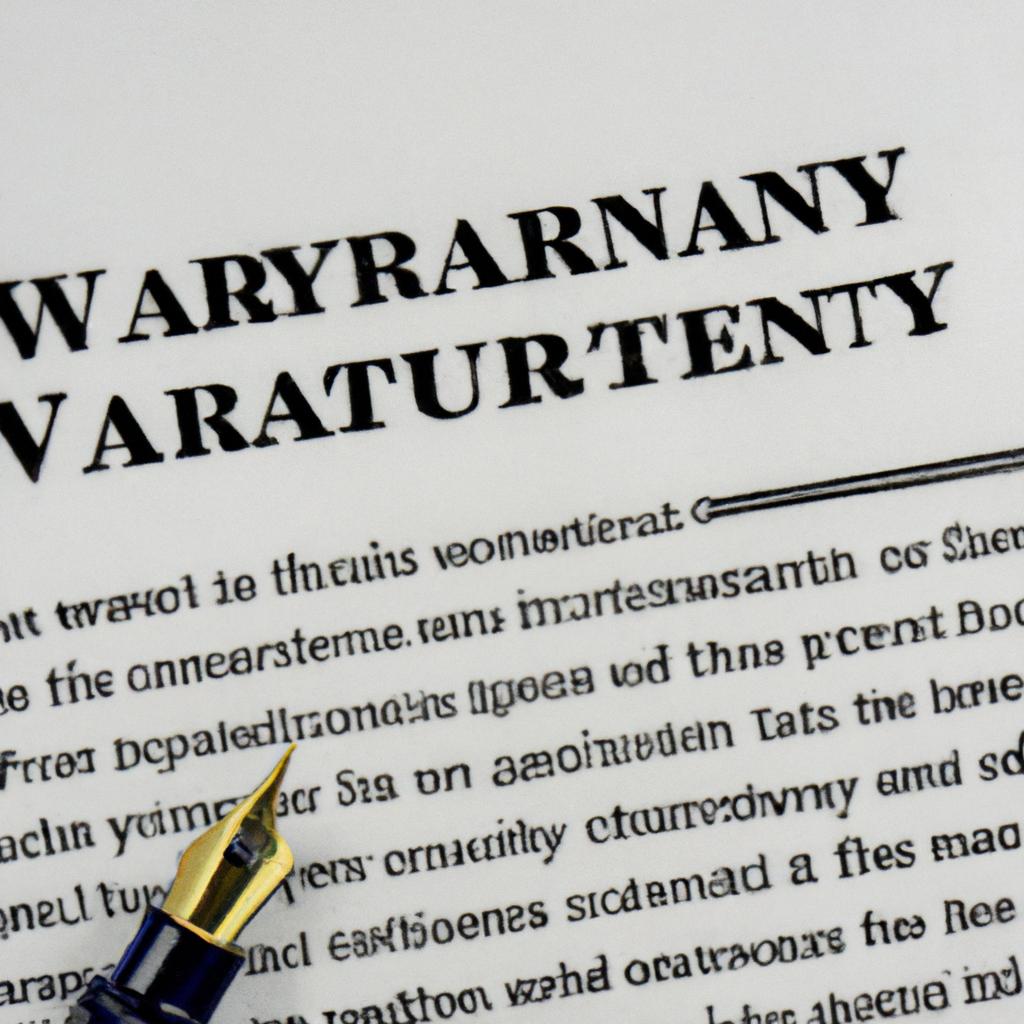In the intricate realm of real estate transactions, the distinctions between a warranty deed and a quitclaim deed can often be the difference between peace of mind and unforeseen complications. As seasoned legal practitioners at Morgan Legal Group in New York City, we understand the nuances of these important documents and their implications for property ownership. Join us as we delve into the complexities of warranty deeds and quitclaim deeds, shedding light on their respective roles in safeguarding property rights.
Key Differences Between Warranty Deeds and Quitclaim Deeds in Real Estate Transactions
In real estate transactions, understanding the differences between warranty deeds and quitclaim deeds is crucial for both buyers and sellers. Warranty deeds offer the buyer the highest level of protection, as the seller guarantees that they have clear title to the property and will defend against any claims made by third parties. This type of deed provides a guarantee of ownership and includes specific promises about the property’s history.
- Offers the highest level of buyer protection
- Includes specific promises about the property’s history
- Seller guarantees clear title and defends against claims
On the other hand, quitclaim deeds provide the least amount of protection for the buyer, as the seller makes no guarantees about the property’s title. This type of deed simply transfers whatever interest the seller may have in the property, without any promises about the property’s history or ownership. Quitclaim deeds are often used in situations where the parties know each other well and trust that there are no title issues.
- Provides minimal protection for buyers
- Does not include any promises about the property’s history
- Transfers the seller’s interest in the property

Understanding the Implications of Warranty Deeds for Buyers and Sellers
When it comes to real estate transactions, understanding the implications of warranty deeds for both buyers and sellers is crucial. A warranty deed guarantees that the seller holds clear title to the property and has the right to sell it. This provides peace of mind to the buyer, knowing that they are protected against any future claims to the property.
On the other hand, a quit claim deed“>quit claim deed offers no such guarantee. With a quit claim deed, the seller simply transfers whatever interest they have in the property to the buyer. This means that the buyer may not have legal recourse if any issues arise with the title down the line. In summary, while a warranty deed offers more protection for buyers, a quit claim deed may be sufficient for certain transactions where the risk is minimal.

Navigating the Benefits and Limitations of Quitclaim Deeds in Property Transfers
In the world of property transfers, quitclaim deeds and warranty deeds are two commonly used legal instruments. Each comes with its own set of benefits and limitations that must be carefully considered before proceeding with a transfer. Let’s delve into the differences between these two types of deeds to help you make an informed decision.
<h2>Benefits of Quitclaim Deeds:</h2>
<ul>
<li><strong>Quick and Easy:</strong> Quitclaim deeds are a straightforward way to transfer property without the legal complexities often associated with warranty deeds.</li>
<li><strong>Non-Covenant Deed:</strong> Quitclaim deeds make no promises or guarantees about the property title, making them suitable for transfers between family members or in situations where the property history is well known.</li>
</ul>Limitations of Quitclaim Deeds:
- No Title Guarantees: Unlike warranty deeds, quitclaim deeds offer no protection against undisclosed title issues or defects.
- Limited Use: Quitclaim deeds are not suitable for real estate transactions where title insurance or a clear title is required, as they do not provide the same level of legal protection as warranty deeds.

Expert Recommendations for Choosing the Right Deed for Your Real Estate Transaction
In the realm of real estate transactions, choosing the right type of deed is crucial to ensure a smooth transfer of property ownership. Two common types of deeds that are often used are warranty deeds and quit claim deeds. Each has its own set of advantages and disadvantages that should be carefully considered before making a decision. Here, we will discuss the key differences between warranty deeds and quit claim deeds to help you make an informed choice.
**Warranty Deed:** This type of deed provides the highest level of protection for the buyer, as it guarantees that the seller holds clear title to the property and has the right to transfer ownership. With a warranty deed, the seller is legally bound to defend the buyer against any claims to the property’s title. This makes it the preferred choice for most real estate transactions, especially when purchasing a property from someone you are not familiar with.
Q&A
Q: What is the difference between a warranty deed and a quit claim deed?
A: A warranty deed guarantees that the seller owns the property free and clear, and will defend the buyer against any future claims. A quit claim deed, on the other hand, simply transfers whatever interest the seller has in the property, with no guarantees.
Q: When should I use a warranty deed versus a quit claim deed?
A: Use a warranty deed when you want to ensure that the property you are buying has a clear title and that you are protected from any future claims. A quit claim deed is more appropriate when you are familiar with the property and are confident in the seller’s ownership.
Q: Are there any risks associated with using a quit claim deed?
A: Yes, there are risks with using a quit claim deed. Since it does not provide any guarantees about the seller’s ownership of the property, you may not be fully protected if any issues arise in the future.
Q: Can a warranty deed be converted into a quit claim deed?
A: No, a warranty deed cannot be converted into a quit claim deed. Once a warranty deed is signed and recorded, it is legally binding and cannot be changed without the consent of both parties.
Q: Which type of deed is more commonly used in real estate transactions?
A: Warranty deeds are more commonly used in real estate transactions because they provide more protection for the buyer. However, quit claim deeds are also used in certain situations, such as transferring property between family members or resolving title issues.
The Conclusion
In conclusion, understanding the differences between a warranty deed and a quitclaim deed is essential when entering into a property transaction. While both deeds serve specific purposes, it is important to carefully consider the protection and risks associated with each type of deed. Ultimately, consulting with a real estate professional or attorney to determine the best option for your situation is highly recommended. By being informed and making educated decisions, you can ensure a smooth and successful property transfer process.
 Warranty vs Quitclaim Deed: Understanding the Differences and Choosing the Right Option
Warranty vs Quitclaim Deed: Understanding the Differences and Choosing the Right Option
When it comes to buying or selling a property, there are various legal documents involved in the process. Two of the most commonly used documents are warranties and quitclaim deeds. These documents are essential in transferring ownership and protecting the rights of the parties involved in a real estate transaction.
While both a warranty deed and a quitclaim deed serve a similar purpose, they have distinct differences that every homeowner and buyer should be aware of. In this article, we will dive into the meaning and differences between a warranty deed and a quitclaim deed and how to determine which one is the right option for you.
What is a Warranty Deed?
A warranty deed is a legal document used to transfer the ownership of real estate from one party to another. This type of deed provides the buyer with a guarantee that the seller is the rightful owner of the property and has the legal right to sell it. A warranty deed also guarantees that the property is free of any liens, encumbrances, or title defects that may affect the ownership rights of the buyer.
In simple terms, a warranty deed is a promise from the seller to the buyer that the property is theirs to sell, and there are no legal issues that could put the buyer’s ownership at risk. This type of deed offers the most protection to the buyer, making it the preferred option for most real estate transactions.
Types of Warranty Deeds:
There are two main types of warranty deeds: general warranty deed and special warranty deed.
1. General Warranty Deed:
A general warranty deed is the most commonly used type of deed in real estate transactions. It provides the buyer with the broadest scope of protection against any defects in the property’s title or ownership. A general warranty deed guarantees the property’s title for the entire history of the property, not just during the current ownership.
2. Special Warranty Deed:
A special warranty deed, also known as a limited warranty deed, offers less protection to the buyer compared to a general warranty deed. This type of deed guarantees that the title is free from defects only during the seller’s ownership of the property. In other words, the seller is not responsible for any title issues that may have occurred before they acquired the property.
What is a Quitclaim Deed?
A quitclaim deed, on the other hand, transfers the ownership rights of a property without providing any guarantees or promises about the property’s title. Unlike a warranty deed, a quitclaim deed makes no guarantees or promises regarding the property’s ownership rights or title. This means that if any title issues arise in the future, the buyer has no legal recourse against the seller.
A quitclaim deed is commonly used in situations where the property’s ownership is already known, such as transferring ownership between family members, gifting a property, or as a means of adding or removing a person’s name from the property’s title.
Differences between a Warranty Deed and a Quitclaim Deed:
1. Guarantees and Promises:
The most significant difference between a warranty deed and a quitclaim deed is the level of guarantee they offer to the buyer. A warranty deed provides the buyer with a guarantee that the seller is the rightful owner of the property and that there are no title defects, while a quitclaim deed makes no promises or guarantees about the property’s title.
2. Level of Protection:
As mentioned earlier, a warranty deed provides the buyer with the most protection compared to a quitclaim deed. In the event that any title issues arise, the buyer can seek legal recourse against the seller. With a quitclaim deed, the buyer has no legal recourse and is solely responsible for their own due diligence.
3. Use Cases:
Warranty deeds are typically used in traditional real estate transactions between two parties who do not have any prior relationships or knowledge of each other. They are also used in commercial real estate transactions where the buyer needs a higher level of protection. Quitclaim deeds, on the other hand, are commonly used for transactions within families, adding or removing someone from a property’s title, or when the parties involved have conducted their own due diligence.
How to Choose the Right Option for You?
As a buyer, it is essential to understand the differences between a warranty deed and a quitclaim deed to make an informed decision. In most cases, a warranty deed is the recommended option as it offers more protection to the buyer. However, if you have prior knowledge or a relationship with the seller, a quitclaim deed could be a suitable option.
It is also crucial to conduct a thorough title search before purchasing a property, regardless of the type of deed being used. This will help identify any potential title defects or issues, giving you a better understanding of the property’s ownership history.
In a Nutshell:
A warranty deed and a quitclaim deed are two distinct legal documents used in real estate transactions. While a warranty deed provides the buyer with a guarantee and protection against title defects, a quitclaim deed makes no promises and offers no protection to the buyer. Understanding the differences between these two deeds is crucial in making the right decision for your real estate transaction.
In conclusion, it is highly recommended to seek the advice of a legal professional when dealing with warranty deeds and quitclaim deeds to ensure proper documentation and protection of your rights as a homeowner or buyer. With this knowledge, you’ll be better equipped to make the right decision when it comes to transferring property ownership.


